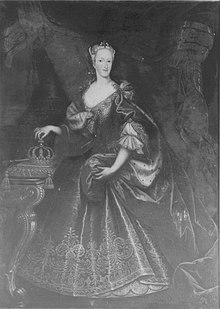Elisabeth Theresa of Lorraine
| Elisabeth Therese of Lorraine | |||||
|---|---|---|---|---|---|

Elisabeth Therese of Lorraine, Queen of Sardinia.
|
|||||
| Queen consort of Sardinia | |||||
| Tenure | 1 April 1737 – 3 July 1741 | ||||
| Born |
15 October 1711 Château de Lunéville, Lorraine |
||||
| Died | 3 July 1741 (aged 29) Palace of Venaria, Turin |
||||
| Burial | 1786 Royal Basilica of Superga, Turin |
||||
| Spouse | Charles Emmanuel III of Sardinia | ||||
| Issue |
Carlo, Duke of Aosta Princess Maria Vittoria Benedetto, Duke of Chablais |
||||
|
|||||
| House |
House of Lorraine (by birth) House of Savoy (by marriage) |
||||
| Father | Leopold Joseph of Lorraine | ||||
| Mother | Élisabeth Charlotte d'Orléans | ||||
| Full name | |
|---|---|
| Élisabeth Thérèse |
Elisabeth Therese of Lorraine (15 October 1711 – 3 July 1741) was born a Princess of Lorraine and was the last queen consort of Charles Emmanuel III of Sardinia. The sister of Francis Stephan, Duke of Lorraine, she died as a result of giving birth to Benedetto of Savoy.
Princess Elisabeth Therese was born at the Château de Lunéville and was the ninth of eleven children of Leopold Joseph of Lorraine and his wife Élisabeth Charlotte d'Orléans. Her mother was a niece of Louis XIV and her father, a son of Eleanor of Austria, Queen of Poland. Her eldest brother became Francis I, Holy Roman Emperor, four years after her death. As a princess of Lorraine she was entitled to the style of Highness as well as the rank of foreign princess in France. During the coronation of the king in October 1722, Elisabeth Therese, her mother, and her sister Anne Charlotte went to the French court. Elisabeth Therese's grandmother found her two granddaughters very charming as well as attractive, though Anne Charlotte was deemed the more beautiful.
In the spring of 1725, the young King Louis XV was fifteen and unmarried. He was engaged to Mariana Victoria of Spain, but the young princess was sent back to Spain because she was too young to conceive. As a result, Élisabeth Charlotte began negotiations to marry her daughter to the king. However, this was met with opposition from the king's prime minister, the Duke of Bourbon, who arranged for the king marry an obscure Polish princess, Marie Leszczynska later that year.
...
Wikipedia
